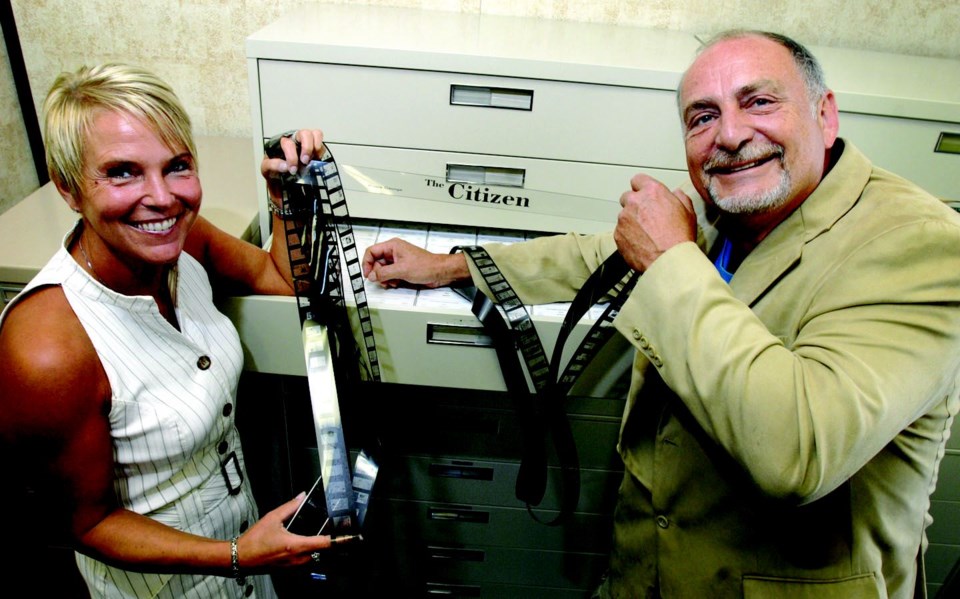The Prince Citizen, through its parent company, Glacier Media Group, is providing $3,000 a year to the Prince George Public Library to help save the city's newspaper history for future generations.
Starting in 2007, the Prince George Public Library began saving the Citizen online with its Prince George newspapers digitization project, transferring images onto computer servers of newspaper pages that had been previously saved on microfilm.
Readers now have access on the library website to every page the Citizen has published from 1916 to 1980.
"What really excites me about this project is we're dealing with community history and historical information that's unique to Prince George and our community and it's quite possible all this data we're putting together is something that the benefits will be experienced over the course of centuries," said Marc Saunders, the library's public service manager. "People will be using this data 300 years from now for their class projects, so it is worth every penny that is going into it. It's pretty rare you get to be involved in a project that has such longterm significance."
"The Citizen has been around since 1916 and it's important that people are able to look back and see the city's evolution," said Citizen publisher Colleen Sparrow. "We often have people coming in asking us how they can access those old newspapers to do research on their family's past or historical events."
If current funding levels remain the same, over the next six years the online library at pgnewspapers.lib.pg.bc.ca will add the remaining Citizen editions, published over the last four decades, to bring digital readers up to date. The library has 600,000 pages still to be scanned and at current costs, it will take an estimated $250,000 to complete it. Saunders said that process could be sped up with more community donations to the project.
The Irving K. Barber Learning Centre's B.C. History Digitization Project provides $15,000 per year, the College of New Caledonia and the University of Northern B.C., Raise-A-Reader, Prince George Community Foundation, and Friends of the Prince George Public Library also provide funding.
The digitizing company, Commonwealth Imaging of Calgary, already has pristine copies of the Citizen microfilm stored in a vault. Once the money is there to pay the costs, those microfilm pages will be scanned to create TIFF images stored on hard drives, to be converted to JPEG 2000 images that will appear on the website.
"We were very deliberate in making sure we worked with high-quality images because we expect as years go by we'll be working from one platform to another as technology changes," said Saunders. "There are no do-overs on this project. We realized right from the beginning we have to do it right and by getting high quality TIFF images of each page of the newspaper, we know we're able to make this project sustainable over the long run."
Since 2003, the library has been archiving digital PDF files of Citizen pages, which are not yet available on the library's website. One of the most frustrating aspects of the library's current online editions for readers and library staff is the lack of a search function that highlights searched words in the text of each page. Saunders admits work also has to be done to improve the print function.
"This is a multigenerational project and we'll get there in time," Saunders said.
Several other area newspapers, now defunct, are also on the library website, including The Leader (1921-23), Prince George Star (1916-1917), Fort George Herald (1910-1915), Fort George Tribune (1909-1915), and the Prince George Post (1914-1915). CNC student newspapers from 1969-2009 are there as well.
"There are a number of other short-run newspapers like the Spruce Needle (1982-983), the Echo (1959-1963), the Clarion (1975), and the Prince George Progress (1964-1970), that we'd also like to digitize as our secondary focus," said Saunders. "The challenge is getting copyright permission and we'll probably have to apply to the copyright board because I believe they are orphaned works. We've searched for a variety of those publishers from those eras without success."
The Citizen has also donated its microfilm record to the library so that it can be properly stored and serve as a physical backup to the existing microfilm currently available to the public at the Bob Harkins branch.


